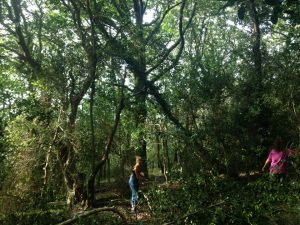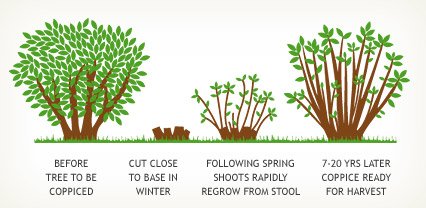As we’ve been learning this week, nature is one of your biggest allies in getting yourself out of a slump. Walking, forest bathing- even living near trees is enough to boost mood and lower stress.
But unless you’re lucky enough to live in the Bahamas, the chances are you’re no stranger to the gloriously wet and windy British weather. It can make it so much harder to step outside and spend restorative time in nature.
In the autumn of my first third year of university I learnt a valuable lesson: there’s no point sulking over lack of sunshine- the best tonic for stress and low moods is getting your boots on and heading outside.
Who knew that volunteering outside (in all weathers) would make me a million times happier than I could ever be hiding from the rain.
I have always found forests to be a place of solace. Having grown up in the woods, a green canopy will forever mean home to me- a place where I can relax and recover from the pressures of everyday life.
I returned to the place of comfort during the third year of my degree, through volunteering during coppicing sessions with Working Woodlands Cornwall.
Anyone with a degree will understand the stress of a hurricane of university deadlines- the looming shadow of deadlines blurring days are increasingly heavy on caffeine and low on sleep.
During this period, I found a way to boost my mental wellbeing through volunteering with Working Woodlands Cornwall- a sustainable forest management group. I worked with founders Tom and Nick to help coppice a section of woodland in Devichoys Nature Reserve.

Coppicing is an age-old method of sustainable woodland management that encourages natural regeneration of healthy forests, providing resources for communities, habitats for fauna and food sources for pollinators.
The forest is sectioned into coups (small sections), and routinely felled on a rotating schedule over a period of 7-20 years. Unlike mass deforestation, this felling enhances the forest, ensuring preservation of habitat and promoting ecosystem renewal.
For the forest, this means one thing- regeneration. As the dappled canopy of leaves comes down, light hits the forest floor. Small flowers and greenery are allowed to thrive, providing food sources for pollinators.
Slowly, brambles and briars take over, crawling to cover the forest floor. We may look at these as a scourge but they play a vital role- they protect the green shoots of new tree growth from grazers, such as deer.
These trees begin to grow up, the green shoots stretching out from the established stools to restore the vast green canopy that was felled.
This does wonders for the forest. It’s a lingering practice from the days communities and their greenspaces were inextricably linked- and the emphasis was on stewardship and harmony, not financial harvest.

But what can coppicing do for us?
As we’ve been learning this week, connecting with the outdoors is one of the most beneficial things a person can do for their mental health. Even just walking through a forest can lower your stress hormones, boost your immune system and spark your creativity.
Volunteering in the forest gave me all that and more- it connected me to a purpose greater than my own, it reinforced my belief in my physical capabilities and it created a space for me and my friends to contribute to our community. It fortified me to continue to achieve throughout my deadlines and helped alleviate the stresses of student life.
It motivated me to get outside, come rain or shine. I’m often guilty of shying away from a rainy day, choosing to curl up with a book or film. As lovely as that is, vegging out in front of the TV is no way comparable to the joy I felt from working outside, come rain or shine.
It's the same feeling I get when I forage- finding connection and purpose in the outside world. I felt high on life and full of wonder at the world around me, despite the rainier days leaving me with water dripping down my face and rain soaked trousers.
So, this mental health week I encourage you to explore your local woodlands. Be it for a walk with the family, a drink with friends or to try forest bathing- a wonderful way to boost your mental wellbeing. You won't believe the wonders it can do for your health- learn more here.
Free yourself from the stress of a hectic work day, or kids testing your patience- take some time to reconnect with yourself in a greenspace, and find your own safe haven in a forest. Why not see if there are any voluntary projects you could get involved in?
To connect yourself to the wild history of greenspaces, check out the latest instalment of Foraging Fairytales, where we’ll be talking witchcraft and inspiring wonder whilst exploring the folklore of the Silver Birch.
To learn more about Working Woodlands and the amazing work they do, click here.
I really enjoyed reading your article, it is so clear and concise. It has encouraged me to plan a visit to my nearest wood
, I’ve heard the bluebells are amazing.